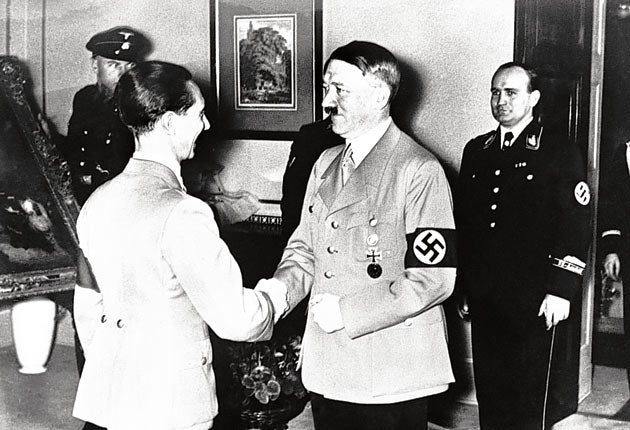Goebbels was a coward: former secretary spills wartime secrets
After 60-year silence, 100-year-old speaks out about the boss she will never forgive

Your support helps us to tell the story
From reproductive rights to climate change to Big Tech, The Independent is on the ground when the story is developing. Whether it's investigating the financials of Elon Musk's pro-Trump PAC or producing our latest documentary, 'The A Word', which shines a light on the American women fighting for reproductive rights, we know how important it is to parse out the facts from the messaging.
At such a critical moment in US history, we need reporters on the ground. Your donation allows us to keep sending journalists to speak to both sides of the story.
The Independent is trusted by Americans across the entire political spectrum. And unlike many other quality news outlets, we choose not to lock Americans out of our reporting and analysis with paywalls. We believe quality journalism should be available to everyone, paid for by those who can afford it.
Your support makes all the difference.The 100-year-old former personal secretary to Hitler's propaganda minister Joseph Goebbels has spoken out about her time with one of the most infamous Nazi war criminals after remaining silent on the subject for more than six decades.
Brunhilde Pomsel, who worked for Goebbels for the last four years of the Second World War and often allowed his six children to play with her typewriter, spoke to Germany's Bild newspaper from her home in Munich after taking five months to decide whether to be interviewed.
Looking extremely frail, and wearing a bright red cardigan and thick spectacles, Ms Pomsel was pictured in her apartment in the Munich suburb of Schwabing. She recalled how, after being bombed out, she was given dresses by Goebbels' wife Magda and said she visited the top Nazi's island villa on a Berlin lake, where she dined on roast goose.
However, Ms Pomsel said she did not like or admire her former employer: "He was unapproachable!" she said. "He never asked me a personal question. He had no idea what my name was right up until the very end." Ms Pomsel's attitude differed from that of other secretaries employed by the regime to work with senior Nazis. Hitler's secretary Traudl Junge, who died in 2002, admitted to being fascinated by her employer. "He was a pleasant boss and a fatherly friend," she said. Her autobiography formed the basis of the 2004 film Downfall about the final days in Hitler's Berlin bunker.
Goebbels shot his wife and then killed himself in Hitler's bunker in the spring of 1945 as the Red Army was invading Berlin. Magda Goebbels poisoned her children beforehand with cyanide pills. Ms Pomsel's described Goebbels' suicide as "cowardly". "He took the easy way out. He should have been sentenced to death but he was too cunning not to realise what would happen to him."
Although Goebbels masterminded the Nazi regime's virulently anti-Semitic propaganda machine, Ms Pomsel told Bild that she only learned about the Holocaust when she was released from captivity five years after the end of the war. "I was a stupid and politically disinterested nobody from a simple background," she said.
She said she arrived in Goebbels' office in 1942 and joined three other secretaries who were already working for him. "I was forced to work there. The only way I could have refused would have been to claim that I had an infectious disease. It was an order," she said. Brunhilde Pomsel spent the last 10 days and nights of the war in the cellars of Goebbels' ministry of propaganda taking cover from Soviet artillery shells.
On 1 May 1945, she was informed of Goebbels' suicide. "The Russians then came and drove us out of the cellar," she said. Ms Pomsel spent the next five years as a prisoner in the former Nazi concentration camps of Buchenwald and Sachsenhausen that had been hastily converted by the Russians into detention centres for captured Nazis. She was finally allowed out in 1950.
She went on to work as a secretary for regional radio before joining Germany's main broadcasting station ARD in Munich. "I never believed I would ever be able to live a happy life," she told Bild. "I will never forgive Goebbels for what he did to the world or for the fact that he murdered his innocent children."
Join our commenting forum
Join thought-provoking conversations, follow other Independent readers and see their replies
Comments